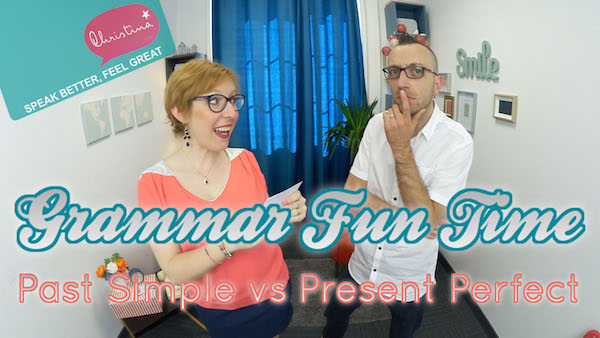
Qui a aimé les leçons de grammaire à l’école ? Lève la main.
Bon. Vous êtes 2… On retente…
Qui galère avec le préterit et le “present perfect” en anglais ? Lève la main.
Ahh, that’s better !
Enfin, c’est pas mieux le fait que tu galères avec la grammaire mais l’épisode d’aujourd’hui t’aidera à savoir s’il faut dire “Did you visit Paris?” ou “Have you visited Paris?”
Mais, si tu penses que ces 2 temps c’est la casse-tête total, cette vidéo est pour toi. (Et pour SBFG Ambassador Christine, qui a demandé une vidéo sur le sujet. Thanks a lot for the great suggestion!)
(Et pour te rassurer, non je vois pas qui a levé la main mais j’imagine que les leçons de grammaire de l’école étaient aussi fun qu’un marathon dans le désert de l’Arizona. En été. Sans eau. No thank you.)
Et je comprends. Le present perfect n’existe pas en français. On utilise souvent le passé composé.
Et pour le prétérit en anglais, l’équivalent en français, c’est… Le passé composé. Si tu raisonne en français, tu vas finir chauve, tellement tu vas t’arracher les cheveux.
Note: Je n’ai rien contre les chauves, mais si la grammaire peut ne pas être une cause de calvitie, c’est mieux pour tout le monde.
En plus cette vidéo s’appelle “Grammar Fun Time”, car tu verras, ensemble avec Romain, on va s’amuser comme si on jouait à Questions Pour Un Champion. Un champion de l’anglais.
Cette semaine pour t’aider à enfin t’en sortir avec le present perfect et le prétérit en anglais, c’est une vidéo interactive et fun qui t’attend.
So get a pen and paper, and let’s have some good ol’ grammar fun!
Did you know that you could sometimes use both the past simple and the present perfect tenses and be correct?
Ou est-ce que tu as une phrase et tu ne sais toujours pas quel temps utiliser, ni pourquoi ?
Si on en parlait dans le commentaires ?
Have a great week in English,
Christina
More good stuff...
Clique l'image pour regarder l'épisode. C'est magique !








Hello Christina, thank you for your video, it’s very useful, it is always been hard to choose between the past simple and the present perfect. I understand much better now, i did not know two answers were possible because one of my teacher always told us it can’t possible, that there was only one good answer.
There is only one thing that i don’t understand ‘Elvis has left the building’, why ‘has left’ because for me ‘Elvis has left’ but it was minutes or hours ago, it is a news but the action is finished, so why ‘has left’ ?
Your videos are great.
Lucile
Hi Lucile,
Thanks so much for the compliment! I’m so happy that this video helped you understand this grammar point a little more! It’s not an easy one, and even English teachers can argue about it!
To answer your question about Elvis, you’re right! It IS a finished action (maybe he left a few minutes ago), but at the same time, it’s an announcement of news (the announcer is informing fans of a change: Elvis was in the building, but now he is not. He has left the building).
So, again, in this case, both “Elvis left” and “Elvis has left” are grammatically correct. It just depends what you want to express more: the fact that it’s finished (He left) or the fact that you’re giving someone news (He has left).
Here’s a good example (the quote at the bottom) where they use both tenses in the same paragraph: http://www.knowyourphrase.com/phrase-meanings/Elvis-Has-Left-The-Building.html
So sometimes, it can be both (but not always 😉
Hello Christina,
Thanks for your answer, it is much more easier to understand with your explanation. Thank you also for both the websites English grammar online and know your phrase, they are very useful and i didn’t know them before.
I’m looking forward to watch your new video.
Lucile
Great, Lucile! Glad to help you discover extra resources for learning English! And the next video will be ready tomorrow, all about how to remember vocabulary better!
See you tomorrow 😉
Hi Christina,
Thank you so much for all these videos which are a great help for me to understand some english learning points.
In the first example of this video :” I got new glasses” the simple past is used even though there is not any finite time word ( ie yesterday, last week …)so why don’t you use the present perfect instead of past simple ?
Thanks for your answer
regards
Florent
Hi Florent! Good to see you here!
To clarify, you don’t have to use a finite time word all the time when you use the simple past.
For example, if you say “I went to Paris” but don’t specify a date, it’s correct too. Even if you don’t specify the date, you’re talking about one specific trip to Paris. You might say “I bought this book when I went to Paris” because you’re talking about a precise finished action, even if you didn’t say “I bought this book when I went to Paris in 2015.” You don’t have to specify the time, because you know that you’re talking about a specific time.
And that’s why you don’t use the present perfect in this case!
Thanks Christina, very helpful. Suddenly, after so many years, things seem to be clearer, with fun also !
And one more expression in my mind like “Elvis has left the building”…
Hi Rosemary!! Yay! That makes me happy to know that you understand the difference in these 2 tenses now! Bravo!
And yes, if you have American friends, you can use “Elvis has left the building” with them, maybe next time a friend leaves a party. They’ll be impressed!
Thanks Christina for your video! Very funny (I couldn’t stop smiling while watching it) and helpful.
From a French native perspective, it can be confusing to understand the difference between these two tenses. I had no idea you can use the past simple or present perfect in some case and it would make no difference.
Can you explain to me what’s the difference between this and that?
Hi Bertrand, Your comment brought a smile to my face too! Thanks!
Yes, these two tenses are confusing for many different people who speak English as a foreign language! It’s not an easy aspect, I agree!
And for “this” and “that”, I’m going to make a video on it, just for you! I’ve added it to the calendar and it’ll be published in October! I’ll be sure to thank you for the suggestion 😉 Thanks!!
Hi Christina…. Aujourd’hui j’avais besoin d’entendre un peu d’anglais pour me remonter le moral ! 😉
Merci pour tes videos toujours pleines d’énergie et faciles à comprendre.
J’ai une petite question mais comme il semble que cette après-midi j’ai utilisé la machine à remonter le tps pas sure que mes remarques arrivent jusqu’à toi… Never mind… J’essaie.
A l’école (a long time ago ! !! ! ) on m’avait dit qu’on utilisait le present perfect simple quand l’action avait un lien avec le présent donc moi j’aurais dit :
« I’ve got new glasses, what do you think? » Parce qu’à ce moment-là on a les lunettes sur le bout du nez donc rapport avec le présent… Je sens que le mal de tête arrive ! LOL !
Hi Isabelle, Désolée d’entendre que ça ne va pas, mais j’espère que j’ai pu te remonter le moral avec mon anglais 🙂
Pour répondre à ta question : Oui, l’explication de l’école est correct. On utilise le présent perfect quand une action dans le passé “touche” le présent (c’est un usage, mais pas le seul…)
Donc, dans ton exemple, l’action au passé est l’achat des lunettes, et la relation avec le présent est que tu as des nouvelles lunettes sur le bout du nez.
Mais…. (car en anglais, il y a toujours un “mais…”)
Il sera aussi correct de dire “I got new glasses” car l’achat reste une action finie, au passé. (Ici, “got” est plus dans le sens de “acheter”. Dans ton exemple, “got” est plus comme “avoir”)
Et aussi, les Américains ont tendance à utiliser le présent parfait beaucoup moins que les Anglais. C’est plus facile à dire “I got new glasses” que “I’ve got new glasses”, et la raison de le dire reste le même : On veut que l’interlocuteur les remarque.
Moral of the story : Inutile de trop se prendre la tête avec past simple vs present perfect simple. Dans beaucoup de cas, les 2 sont acceptables. Et au pire, l’autre personne peut demander une clarification.
Example :
A: I’ve gone to the movies yesterday.
B: You mean you went to the movies yesterday?
A: Yes, that’s what I meant
OR
A: I worked here for 8 years.
B: But you still work here, don’t you?
A: Yes… for 8 years.
B: Oh, ok, you’ve worked here for 8 years. Got it.
C’est complètement normal dans une conversation de ne pas se comprendre 100% du temps ! No stress!